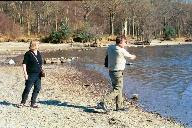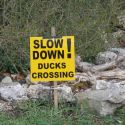Breakfast between eight and ten, but it's brought on trays to the tables as each guest arrives, which probably makes sense rather than laying it out cafeteria style, as there don't seem to be a lot of guests. The disadvantage is that, apart from the basket of sliced bread, each meal is pre-chosen and exactly the same, so that one cannot, for example, choose extra tomato but none of the ricotta-like anari cheese - fresh, mild, tasteless, and damp, and reminding me slightly of mortar, though I obviously haven't tasted mortar. Plenty of protein, though. With a baked? egg and golden browned slices of halloumi.
At the next table are a father and son from, of all places, Sault Ste Marie. They're cycling round the island, starting in Larnaca. Quite impressive. The son is fortyish, but the father is closer to our age.
Living in Famagusta is living in an archaeological site, with ruins and (some) restored buildings everywhere, some dating back to the twelfth or thirteenth century. Sadly, the sanctions insisted on by the South, combined with the sinking value of the Turkish lira, have made life very difficult and left too little hope for the future of the young. The old city is alive between mid-morning and late afternoon, when the tourist buses disgorge people - mostly staying in the South - from Europe and the UK. They stop at the restaurants and cafés. Maybe they pick up small souvenirs, and then they're gone. Does anyone buy the designer jeans, the brand name handbags, the gold jewellery? Maybe, but there's such a short window of time, and prices no less than the South, although the meals are a little less. Few people still live in the old city and many of the houses are shut up and in need of repair, with broken windows and deteriorating roofs. It's sad, and also enraging, because, like much human suffering, it's unnecessary.
Not entirely different outside the old city. We wander beyond the gates and pass many restaurants that have closed. Also shops. Photography shops, barber shops, and pharmacies seem plentiful, but there are many closed up restaurants, and even food markets. We do pass a statue we'd forgotten - that of the mother and children murdered in the bath. This commemorates an horrific event from Christmas Eve 1963, widely reported in the British (although not Greek Cypriot) press at the time, when the wife and three small children of a Turkish Major Ilhan were murdered along with friends as they tried to hide in the bathroom of their Nicosia home as part of the massacre of over a hundred Turkish Cypriots by Greek Cypriot militia thugs.
Stop at a café of locals - no tourists - for doner kabobs and beer. Then home, to the quiet, gently lit streets within the walls.

























